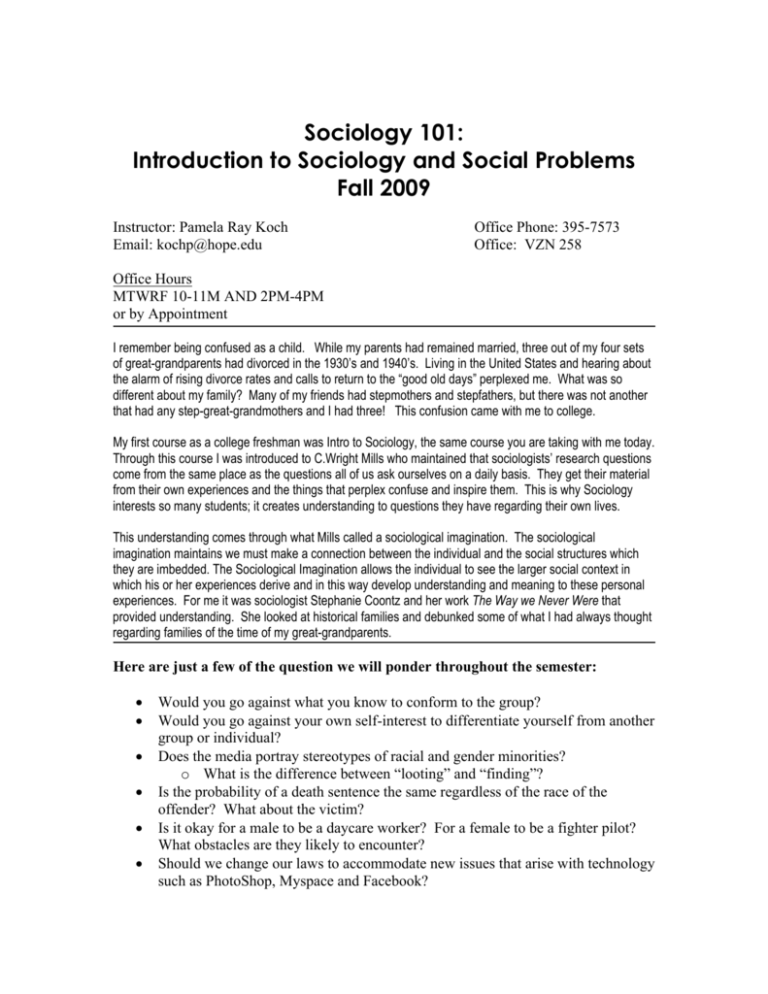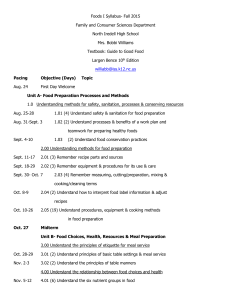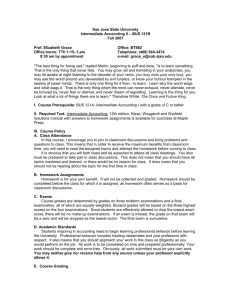
Sociology 101:
Introduction to Sociology and Social Problems
Fall 2009
Instructor: Pamela Ray Koch
Email: kochp@hope.edu
Office Phone: 395-7573
Office: VZN 258
Office Hours
MTWRF 10-11M AND 2PM-4PM
or by Appointment
I remember being confused as a child. While my parents had remained married, three out of my four sets
of great-grandparents had divorced in the 1930’s and 1940’s. Living in the United States and hearing about
the alarm of rising divorce rates and calls to return to the “good old days” perplexed me. What was so
different about my family? Many of my friends had stepmothers and stepfathers, but there was not another
that had any step-great-grandmothers and I had three! This confusion came with me to college.
My first course as a college freshman was Intro to Sociology, the same course you are taking with me today.
Through this course I was introduced to C.Wright Mills who maintained that sociologists’ research questions
come from the same place as the questions all of us ask ourselves on a daily basis. They get their material
from their own experiences and the things that perplex confuse and inspire them. This is why Sociology
interests so many students; it creates understanding to questions they have regarding their own lives.
This understanding comes through what Mills called a sociological imagination. The sociological
imagination maintains we must make a connection between the individual and the social structures which
they are imbedded. The Sociological Imagination allows the individual to see the larger social context in
which his or her experiences derive and in this way develop understanding and meaning to these personal
experiences. For me it was sociologist Stephanie Coontz and her work The Way we Never Were that
provided understanding. She looked at historical families and debunked some of what I had always thought
regarding families of the time of my great-grandparents.
Here are just a few of the question we will ponder throughout the semester:
•
•
•
•
•
•
Would you go against what you know to conform to the group?
Would you go against your own self-interest to differentiate yourself from another
group or individual?
Does the media portray stereotypes of racial and gender minorities?
o What is the difference between “looting” and “finding”?
Is the probability of a death sentence the same regardless of the race of the
offender? What about the victim?
Is it okay for a male to be a daycare worker? For a female to be a fighter pilot?
What obstacles are they likely to encounter?
Should we change our laws to accommodate new issues that arise with technology
such as PhotoShop, Myspace and Facebook?
Welcome to the world of Sociology! All throughout our social lives, from Hurricane
Katrina, to the Super Bowl, sociologists are there explaining social life. I hope you will
bring the questions you have regarding your life experiences and that you will enjoy our
time together and can find your sociological imagination.
REQUIRED TEXTBOOKS
Henslin, James M. 2007. Essentials f Sociology: A Down-to-Earth Approach, 7th Edition.
Boston, MA: Allyn & Bacon.
This is the main textbook for the course. Henslin takes an “everyday” approach to Sociology
which is relatable to our daily lives. Thus, class participation and discussion can easily be
facilitated from the reading. You should make every attempt to complete the readings prior to
class the day they are assigned and come to class prepared to participate. Readings in this main
text are listed under the “Henslin” column of the course schedule on the day they are to be done.
MCgEEVER, Kelly and Charles Faupel. 2008. Exercises in Sociology A Lab Manual for the
Study of Social Behavior. Pearson Prentice Hall.
This is your lab workbook. Please bring this book to class as well as we will do some of the
group exercises together. In addition to the labs discussed later, there are readings in this lab
manual that you will be responsible for. These readings will be discussed in class and will be
included on examinations. These readings are listed by the title of the reading and are followed
by L: page number in the class schedule.
Turning Point Audience Response clicker.
Available at the bookstore. This clicker should be brought to class everyday. My powerpoint
presentations will incorporate times for your anonymous participation. This clicker will also be
used to accomplish some of the in class assignments/participation points towards your final grade.
Moodle
A Moodle site has been set up for this course. It has the syllabus (should you lose this
one) and other course materials available.
COURSE OBJECTIVES/PURPOSE
•
An understanding that the social world around us is a complex structure which
impacts our daily lives and life chances.
•
Consideration of social problems facing the world today and possible solutions
through the principles of Sociology using our “sociological imagination”.
•
Development of critical reasoning skills that will make us healthier and more
skeptical consumers of social research.
•
A broader understanding of what cultural diversity is and what it brings to the
global and national landscape.
SPECIAL NOTES
This class is a “flagged” course. This means that a majority of the material deals with
issues of class, race, gender and nationality, or age. Sociologists have long been
interested in how these characteristics become culturally defined and in the process,
culturally valued. You are required to take 4 credits of “flagged” courses during your
Hope College career (I encourage you to take more). Completing Sociology 101 fulfills
this core requirement.
Class participation is expected in this course. Sociology is animated and given life
through personal experience. So try to come to class with your experience and viewpoints
and an open mind. Throughout the semester this class may upset you, frustrate you and at
the same time inspire you. Open up and share with the class your experiences, views,
opinions and thoughts. Also, remain courteous to your classmates while they do the
same. I will not tolerate mockery of any student for participating in my class. This class
should feel like a “safe” place to ask your questions about social life and to build and
understanding of the same.
Course Evaluation
Hope College expects all students to assess each course in an effort to continuously
improve student learning. At the end of the semester, you will be asked to assess how
well this course met its stated goals. Your responses will be kept anonymous, but I will
take the collective results seriously in thinking about how to provide Hope students the
best possible education. Your responses matter. You are urged to participate in this
important process.
Disability Policy
Any student whose disability falls within Americans with Disability Act guidelines
should inform the instructor at the beginning of the semester of any special
accommodations or equipment needs necessary to complete the requirements for this
course. Students must register documentation with the Office of Disability Services
and/or Academic Support Center. If you have questions, call Student Development at
extension 7800.
GRADING
Final Grades will be calculated on the following basis
Exams 100 points each
Final Exam (150 Points)
Class assignments/participation
Out of Class Labs (10 points each)
Water Report
TOTAL:
3 x100
1x 150
10x10
300
150
80
100
20
650
Exams
Three examinations will be given throughout the course of the semester. Exams may
consist of matching, true/false, multiple choice and short answer questions. The
questions cover materials from the assigned chapters of the text and readings as well as
class notes. Exams are to be taken on the day that they are scheduled. Makeup exams
will only be given if prior arrangements have been made, or with a doctor’s note.
Final Exam
The final exam will be similar to regular exams in format but will be cumulative and
worth 150 points.
In Class Assignments/participation
Class participation is important in a sociology course. Therefore, it is crucial that you
attend class on a regular basis and engage in the material we are covering. I do not take
attendance nor do I have a formal attendance policy. However, you will have 80 points
towards your final grade that will be composed on class participation and in-class
assignment points. Periodically, and without prior notification I will provide
opportunities for students to earn these through in class activities. Some activities will
only require you sign in others will be reflection writings on class activity. There will be
no making up missed in class activity points. You either participate or you do not.
Water Report
Hope College sponsors a yearly Critical Issues Symposium. During this conference
numerous speakers are brought into discuss an issue that affects our society. This year’s
topic is water. I encourage you to fully participate in this exciting opportunity afforded
by Hope College. You will be expected to attend one of the conference s(acceptable
options will be provided in class prior to the symposium) and write a 2-3 page recap and
reflection paper on the session. The water report is due on October 9.
Out of Class Lab
This course qualifies for a Social Science I class with the accompanying lab. These labs
are designed to illustrate how research is performed in the social sciences at a basic
introductory level. They also may facilitate interest for more advanced social research in
your college career (I encourage you to think about this exciting possibility). You must
complete 10 labs throughout the course of the semester. There are 13 labs available for
completion and are listed on the next page along with the page number and helpful hints
for the labs. These labs are listed as either “internet exercises” or “Individual writing
exercises” based on which they are delineated as in your lab book. The labs are due in
class on the day listed below NO LATE LABS WILL BE ACCEPTED. Also many of the
labs are intensive it is best not to begin them the night before they are due.
Due
Date
Sept 11
Sept 16
Sept 23
Oct 5
Oct 12
Lab Manual
Chapter
Chapter 2:
Internet exercise
lab
Chapter 3
Internet Exercise
lab
Chapter 4:
Individual
writing lab
Chapter 6:
Individual
writing lab
Chapter 7:
Internet Exercise
lab
Page
#
14
24
Helpful Hints
•
•
Don’t dwell on question 3
For question 4 only consider the
Nacirema piece
•
Please select two high income
countries, one upper middle country,
one lower middle country and two
low income country
On question 2 malnutrition and pave
roads will be missing for most
countries. Please select completion
rates for school enrollment, omit
literacy rates. Add internet, and the
ratio of boys to girls
38
69
76
•
Oct 23
Oct 26
Nov 4
Nov 18
Nov 23
Nov 30
Dec 4
Chapter 1:
Individual
writing lab
Chapter 9:
Internet Exercise
lab
Chapter 11:
Internet Exercise
Lab
Chapter 12:
Internet exercise
lab
Chapter 14:
Internet exercise
lab
Chapter 13:
Internet exercise
lab
Chapter 16:
Internet exercise
lab
8
98
•
For question #2 omit the “did you
know section” this no longer exists.
123
•
for question 1 omit Taiwan
132
•
Omit question #3
•
You do not have to provide natural
growth
Exporting it to excel will assist in
rankings
Replacement level is 2.3
157
145
179
•
•
Dec 7
Chapter 17:
Individual
writing exercise
lab
195
•
this lab requires a 3 day log plan
ahead
FINAL GRADE
Your numeric grade =
points you attained
points available (650)
Grades will be determined using the following scale:
100-93
92-90
89-87
86-83
82-80
79-77
A
AB+
B
BC+
76-73
72-70
69-67
66-63
62-60
<60
C
CD+
D
DF
CLASS SCHEDULE
Date
Class Topic
Henslin
Readings
Lab Manual reading
Sept 2
Introduction to the
Course
Sept 4
What is Sociology
What is a Social
Problem?
PAGES 2-14
“The Promise” pg 1
Sept 7
What Does Sociology
provide?
PAGES 14-20
Sept 9
How do Sociologists do
what they do?
PAGES 20-31
Sept
11
How do Sociologists do
what they do?continued
Sept
14
What is Culture?
PAGES 34-48
Sept
16
Issues in Culture
PAGES 48-57
Sept
18
Theories of Socialization
PAGES 60-72
Sept
21
Socialization by Who
and to What?
PAGES 72-82
Sept
23
The Effect of Isolation
In class video: The story
of Genie
Sept
25
Social Structure
PAGES 84—98
Sept
28
Social Interaction
PAGES 98-112
“Pathology of imprisonment” PG 42
Sept
EXAM I
EXAM I
EXAM I
Say what you mean pg 12
“Participant and Non-Participant
Observation” pg 16
“Body Ritual among the Nacirema”
PG20
“ Identity Transformation” PG 31
30
Oct 2
Societies and Groups
PAGES 114-123
Oct 5
Group Dynamics
In Class video:Milgram
PAGES 130-139
Oct 7
CRITICAL ISSUES NO
CLASS
CRITICAL
ISSUES NO
CLASS
CRITICAL ISSUES NO CLASS
Date
Class Topic
Henslin
Readings
Lab Manual reading
Oct 9
Bureaucracy
PAGES 124-130
Oct
12
Social Inequality: Social
Stratification
Chapter 7
Oct
14
Show me the Money:
Social Stratification in
the US
Chapter 8
“No degree and No way Back”
PG73
Oct
16
Runaways: The Social
problem of Homeless
Youths. In class video
Oct
19
FALL RECESS
FALL RECESS
FALL RECESS
Oct
21
Social Inequality Race
and Ethnicity
Chapter 9
“ Anatomy of Environmental racism”
PG105
Oct
23
Racism in the United
States
In Class Video
Oct
26
Social Inequality:
Gender Inequality
PAGES 260-281
“A woman can learn anything” PG
96
Oct
28
Issues of Gender
Inequality
Oct
30
Social Inequality: Age
PAGES 282-293
Nov 2
EXAM II
EXAM II
“Women’s and Men’s Movements”
PG 103
EXAM II
Nov 4
“It’s the Economy Silly”
PAGES 309-326
“The power elite” PG 118
Nov 6
Politics
PAGES 296-309
“types of governmental and political
systems” (PG 125)
Nov 9
Deviance and Social
Control
PAGES 140-157
“A career Perspective on Heroin” PG
83
Nov
11
In Class Video: The
Case of Eric Smith
Nov
13
Crime and the Justice
System
PAGES 158-167
PG92- The criminal Court system
Nov
16
Date
We are Fam-ily
Chapter 12
Class Topic
Henslin
Readings
Nov
18
Alternative Family
Forms: Polygamy
In Class Video: Inside
Polygamy
Nov
20
What is the Future for
the Family?
Nov
23
Education
Nov
25
Problems in Funding
Education
In class video: Corridor
of Shame
Nov
27
Lab Manual reading
“Love American Style” PG 129
PAGES 358-374
“ The Negotiated order of the class”
PG 151
THANKSGIVING
NO CLASS
HAPPY TURKEY DAY!
Nov
30
Religion
PAGES 374-389
“A peculiar people” PG 139
Dec 2
EXAM III
EXAM III
EXAM III
Dec 4
Population and
Urbanization
chapter 14
“Cornerville and its people” PG 175
Dec 7
The Environment
PAGES 439-449
“Historical transformation” PG 184
“ Sustainable Development and
Environment” (PG 197)
Dec 9
Social Change and
collective behavior
PAGES 426-439
“Social Movements” (PG 205)
“Collective Behavior” (PG 207)
Dec
11
Technology
DEC
15
FINAL EXAM at 12:30
“ will the Internet change society”
PG 199
FINAL EXAM
12:30
FINAL EXAM 12:30








